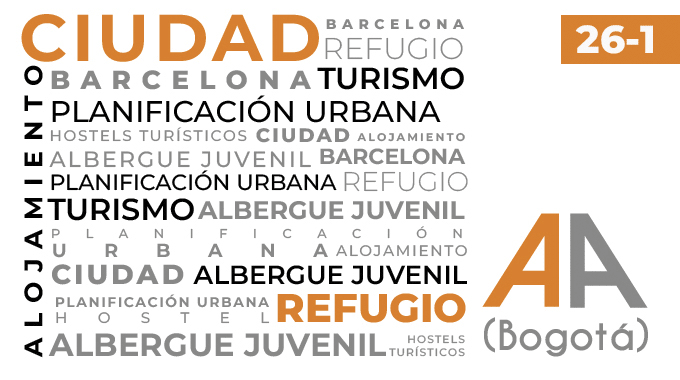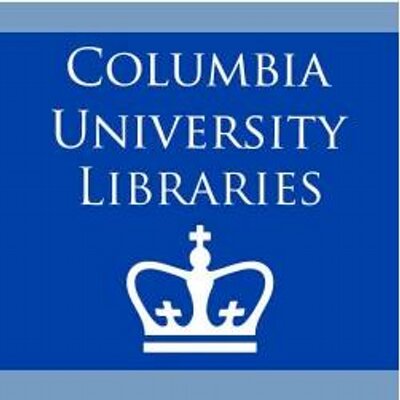

Esta obra está bajo una licencia internacional Creative Commons Atribución-NoComercial 4.0.
La Revista de Arquitectura se cataloga como una publicación de acceso abierto. Más información >>>
Los autores conservarán los derechos de autor y garantizarán a la Revista de Arquitectura el derecho de primera publicación de la obra, el cual estará simultáneamente sujeto a la licencia Creative Commons (CC) BY-NC.
Los autores suscribirán una licencia no exclusiva de distribución de la versión de la obra publicada mediante la firma de (RevArq FP03 Autorización reproducción)
El Autoarchivo estará de acuerdo con los criterios expresados por SHERPA/RoMEO y la clasificación Verde.
Para ver en detalle estos lineamientos, por favor consultar >>>
Resumen
En el transcurso de las últimas décadas ha existido un crecimiento significativo de hostels turísticos en las ciudades principales del país, fenómeno que repercute a distintos niveles en las zonas en las que se instalan. El objetivo de la presente investigación es explorar y documentar el proceso de consolidación del hostel en el ámbito urbano, tanto cuantitativa como cualitativamente, a partir del análisis de una muestra de cien hostels vigentes en 2019 y localizados en el municipio de Barcelona. El artículo examina su evolución en el tiempo atendiendo a cuatro atributos: el número de establecimientos y de las plazas ofertadas, la localización, la variación de la capacidad de cada hostel y la forma de implantación en el estrato construido. Del estudio se extrae que en las últimas décadas el hostel ha pasado de ser inexistente en la ciudad a disponer de edificios específicos, lo que permite confirmar su introducción como una forma de alojamiento nueva en la ciudad, así como determinar posibles criterios de crecimiento futuro que permitan reflexionar sobre sus efectos y la necesidad de responder a la nueva situación.
Palabras clave

Citas
Abrantes, J., & Reis, J. (2021). A evolução dos hostels na cidade de Lisboa. Revista Turismo & Desenvolvimento, 36(2), 287-301. https://doi.org/10.34624/rtd.v36i2.4615
Ajuntament de Barcelona. (2017). Pla especial urbanístic per a l’ordenació dels establiments d’allotjament turístic, albergs de joventut, residències col·lectives d’allotjament temporal i habitatges d’ús turístic a la ciutat de Barcelona (PEUAT). Ajuntament de Barcelona. http://hdl.handle.net/11703/101005
Álvarez Sousa, A. (2020). La percepción de los problemas del overtourism en Barcelona. RECERCA. Revista De Pensament I Anàlisi, 26(1), 59-92. https://doi.org/10.6035/Recerca.2021.26.1.4
Barry, K. (2020). Momentarily immobile: Backpacking, farm work, and hostels in Bundaberg, Australia. Geographical Research, 59(1), 46-55. https://doi.org/10.1111/1745-5871.12445
Chamizo-Nieto, F. J., Nebot-Gómez de Salazar, N., Rosa-Jiménez, C., & Reyes-Corredera, S. (2023). Touristification and conflicts of interest in cruise destinations: The case of main cultural tourism cities on the Spanish mediterranean coast. Sustainability, 15(8), 6403. https://doi.org/10.3390/su15086403
Cocola-Gant, A. (2023). Place-based displacement: Touristification and neighborhood change. Geoforum, 138, 103665. https://doi.org/10.1016/j.geoforum.2022.103665
Crespi-Vallbona, M. (2021). La “metropolitanización” del turismo: el caso del Área Metropolitana de Barcelona. Ciudad y Territorio Estudios Territoriales, 53(209), 685-700. https://doi.org/10.37230/CyTET.2021.209.05
Crespi-Vallbona, M., & Domínguez-Pérez, M. (2021). Las consecuencias de la turistificación en el centro de las grandes ciudades: el caso de Madrid y Barcelona. Ciudad y territorio estudios territoriales, 53(M), 61-82. https://doi.org/10.37230/CyTET.2021.M21.04
de-la-Calle-Vaquero, M., García-Hernández, M., & Mendoza-de-Miguel, S. (2020). Urban planning regulations for tourism in the context of overtourism. Applications in historic centres. Sustainability, 13(1), 70. https://doi.org/10.3390/su13010070
De-Miguel-Pastor, M., & Sentieri-Omarrementería, C. (2022). Hostels urbanos. Acampada en paisaje doméstico. Barcelona como caso de estudio. VLC arquitectura, 9(1), 189-218. https://doi.org/10.4995/vlc.2022.15609
De-Moura-Pavão-Farias, D., Valença, M. N., Sobral, M. F. F., & Bezerra-Ribeiro, A. R. (2022). Hostelquality: A methodology for assessing the quality of hostels. Tourism and Hospitality Research, 0(0). https://doi.org/10.1177/14673584221133668
Engelsmann, S., Peters, S., Dengler, C., & Streib, J. (2019). Youth hostel Bayreuth: Conceptually innovative and structurally. Bautechnik, 96(1), 48-57. https://doi.org/10.1002/bate.201800085
Fundació Pere Tarrés. (2017). Cronologia // Fundació Pere Tarrés. Fundació Pere Tarrés. https://www.peretarres.org/arxius/fpt/60-aniversari-fundacio-peretarres.pdf
Gelbman, A. (2021). Tourist experience and innovative hospitality management in different cities. Sustainability, 13(12), 6578. https://doi.org/10.3390/su13126578
Generalitat de Catalunya. (2019a). Idescat. Anuari estadístic de Catalunya. Instal·lacions juvenils. Per tipus. Comarques i Aran. 2018. Generalitat de Catalunya. https://www.idescat.cat/indicadors/?id=aec&n=15789&t=201800
Generalitat de Catalunya. (2019b). Xarxa Catalana d'Instal·lacions Juvenils. Generalitat de Catalunya. https://jovecat.gencat.cat/ca/temes/vacances_i_estades/xarxa_catalana_instalacions_juvenils/
Hannam, K., & Diekmann, A. (2010). Chapter 1. From backpacking to flashpacking: Developments in backpacker tourism research. En K. Hannam & A. Diekmann (Eds.), Beyond Backpacker Tourism (pp. 1-7). Multilingual Matters. https://doi.org/10.21832/9781845411329-004
Hoolachan, J. (2022). Making home? Permitted and prohibited place-making in youth homeless accommodation. Housing Studies, 37(2), 212-231. https://doi.org/10.1080/02673037.2020.1836329
Hory, G., Major, Z., Müllner, P., & Benko, M. (2017). Exploration of spatial design issues at backpacker hostels in Budapest׳s historic center: Informality, density, and adaptability. Frontiers of Architectural Research, 6(2), 157-168. https://doi.org/10.1016/j.foar.2017.02.005
Ibrahim, N. L. N. (2021). BACKHOME: Transformation of Old Shop Houses into a Contemporary Backpackers’ Hostel with Better Indoor Environmental Quality. Civil Engineering and Architecture, 9(7), 2169-2177. https://www.hrpub.org/download/20211030/CEA6-14824530.pdf
Jablonska, J., & Trocka-Leszczynska, E. (2020). Reconstruction with a change of function – ergonomics of the hotel environment. En J. Charytonowicz & C. Falcão (Eds.), Advances in Human Factors in Architecture, Sustainable Urban Planning and Infrastructure (pp. 34-44). Springer. https://doi.org/10.1007/978-3-030-20151-7_4
Jarvis, J., & Peel, V. (2010). Flashpacking in Fiji: Reframing the “global nomad” in a developing destination. En K. Hannam & A. Diekmann (Eds.), Beyond Backpacker Tourism: Mobilities and Experiences (pp. 21-39). Channel View. https://research.monash.edu/en/publications/flashpacking-in-fiji-reframing-the-global-nomad-in-a-developing-d
Kumar, S., Mathur, A., Kukreja, R., & Bagha, A. K. (2022). Quantification of thermal environments and comfort expectations of residents in hostel dormitories during hot and humid days in Indian composite climate. Advances in Building Energy Research, 16(1), 1-35. https://doi.org/10.1080/17512549.2020.1746928
Liberalesso, T., Mutevuie Júnior, R., Oliveira-Cruz, C., Matos-Silva, C., & Manso, M. (2020). Users’ perceptions of green roofs and green walls: An analysis of youth hostels in Lisbon, Portugal. Sustainability, 12(23), 10136. https://doi.org/10.3390/su122310136
Liberato, P., Nogueira, R., & Liberato, D. (2022). Perspectives of social sustainability in urban tourism. Comparative study between Porto and Barcelona. En A. Abreu, D. Liberato, & J. C. Garcia Ojeda (Eds.), Advances in Tourism, Technology and Systems (pp. 611-624). Springer Nature. https://doi.org/10.1007/978-981-19-1040-1_51
López‐Gay, A., Cocola‐Gant, A., & Russo, A. P. (2021). Urban tourism and population change: Gentrification in the age of mobilities. Population, Space and Place, 27(1), e2380. https://doi.org/10.1002/psp.2380
Maimí i Pou, B. (2017). Impacto económico de los albergues de juventud en Catalunya y su papel como dinamizador turístico [Tesis doctoral, Universitat Abat Oliba CEU]. https://www.tdx.cat/bitstream/handle/10803/450857/Tbmp.pdf
Mansilla, J. A., & Milano, C. (2019). Becoming centre: Tourism placemaking and space production in two neighborhoods in Barcelona. Tourism geographies, 24(4-5), 599-620. https://doi.org/10.1080/14616688.2019.1571097
Martín, D. (2018, 10 de diciembre). Informe 2018 de Cadenas de Hostels: El foco se aleja de Barcelona. Alimarket. https://www.alimarket.es/hoteles/informe/288868/informe-2018-de-cadenas-de-hostels/noticias
Musa, G., & Thirumoorthi, T. (2011). Red Palm: Exploring service quality and servicescape of the best backpacker hostel in Asia. Current Issues in Tourism, 14(2), 103-120. https://doi.org/10.1080/13683500903511125
Nagy, G. (2016). The evolution of privacy in German youth hostels. Journal of hospitality and tourism management, 29, 184-188. https://doi.org/10.1016/j.jhtm.2016.09.003
Nash, R., Thyne, M., & Davies, S. (2006). An investigation into customer satisfaction levels in the budget accommodation sector in Scotland: A case study of backpacker tourists and the Scottish Youth Hostels Association. Tourism Management, 27(3), 525-532. https://doi.org/10.1016/j.tourman.2005.01.001
O’Regan, M. (2010). Chapter 6. Backpacker hostels: Place and performance. En K. Hannam & A. Diekmann (Eds.), Beyond Backpacker Tourism (pp. 85-101). Multilingual Matters. https://doi.org/10.21832/9781845411329-009
O’Reilly, C. C. (2006). From drifter to gap year tourist. Annals of Tourism Research, 33(4), 998-1017. https://doi.org/10.1016/j.annals.2006.04.002
Oliveira-Brochado, A., & Gameiro, C. (2013). Toward a better understanding of backpackers’ motivations. Tékhne, 11(2), 92-99. https://doi.org/10.1016/j.tekhne.2013.11.001
Paris, C. (2010). Chapter 4. The virtualization of backpacker culture: Virtual mooring, sustained interactions and enhanced mobilities. En K. Hannam & A. Diekmann (Eds.), Beyond Backpacker Tourism (pp. 40-63). Multilingual Matters. https://doi.org/10.21832/9781845411329-007
Paris, C. M. (2012). Flashpackers: An emerging sub-culture? Annals of Tourism Research, 39(2), 1094-1115. https://doi.org/10.1016/j.annals.2011.12.001
Pitanatri, P. D. S., & Pitana, I. G. (2019). What do we know about flashpacker? A review. The 3rd Bali International Tourism Conference, 23-33. https://www.balitourism.or.id/wp-content/uploads/2019/09/The_3rd_BITC_2019.pdf
Porfido, E., Tomàs, M., & Marull, J. (2023). A new urban diagnostics approach for measuring touristification: The case of the Metropolitan Area of Barcelona. Journal of Urban Management, 12(3), 195-207. https://doi.org/10.1016/j.jum.2023.03.003
Ramos, S. P., & Mundet, L. (2021). Tourism-phobia in Barcelona: dismantling discursive strategies and power games in the construction of a sustainable tourist city. Journal of Tourism and Cultural Change, 19(1), 113-131. https://doi.org/10.1080/14766825.2020.1752224
Red Española de Albergues Juveniles [REAJ]. (s. f.). Alberg Barcelona Xanascat Hostel—REAJ. REAJ. Recuperado 6 de noviembre de 2019, de https://reaj.com/albergues/mare-de-deu-de-montserrat/
Revell, K. D. (2020). Luxury Hotels and Urban Hostels: Carl Fisher, Resort Architecture, and the Contrasting Worlds of Miami Beach's Pre-Depression-Era Lodging. Journal of the Society of Architectural Historians, 79(1), 39-60. https://doi.org/10.1525/jsah.2020.79.1.39
Richards, G. (2016). Hostels and the making of new urban spaces. En A. Russo & G. Richards (Eds.), Reinventing the local in tourism: Producing, consuming and negotiating place (pp. 171-184). Channel View.
Romão, J., Domènech, A., & Nijkamp, P. (2023). Tourism in common: Policy flows and participatory management in the Tourism Council of Barcelona. Urban Research & Practice, 16(2), 222-245. https://doi.org/10.1080/17535069.2021.2001039
Russo, A. P., Soro, E., & Scarnato, A. (2022). Is another tourism possible? Shifting discourses in Barcelonas tourism politics. En J. Van Der Borg (Ed.), A Research Agenda for Urban Tourism (pp. 257-279). Edward Elgar. https://doi.org/10.4337/9781789907407.00021
Sánchez, M., & López-de-Ávila, A. (2010). El movimiento alberguista: el placer de compartir: estudio comparado de la legislación vigente en materia de albergues de España y recomendaciones para la Comunidad de Madrid. IE Business School.
Sánchez-Aguilera, D., & González-Pérez, J. M. (2021). Geographies of gentrification in Barcelona. Tourism as a driver of social change. En J. Dominguez-Mujica, J. McGarrigle, & J. M. Parreño-Castellano (Eds.), International Residential Mobilities (pp. 243-268). Springer International Publishing. https://doi.org/10.1007/978-3-030-77466-0_13
Timothy, D., & Teye, V. (2009). Youth hostels and backpacker accommodation. En D. Timothy & V. Teye (Eds.), Tourism and the Lodging Sector (pp. 213-226). Routledge.
Veríssimo, M., & Costa, C. (2018a). Do hostels play a role in pleasing Millennial travellers? The Portuguese case. Journal of Tourism Futures, 4(1), 57-68. https://doi.org/10.1108/JTF-12-2017-0054
Veríssimo, M., & Costa, C. (2018b). Understanding the new backpackers: A literature review. Revista Turismo & Desenvolvimento, 29, 7-19. https://proa.ua.pt/index.php/rtd/article/download/880/718
Wilson, J., & Richards, G. (2008). Suspending reality: An exploration of enclaves and the backpacker experience. Current Issues in Tourism, 11(2), 187-202. https://doi.org/10.2167/cit371.0
































